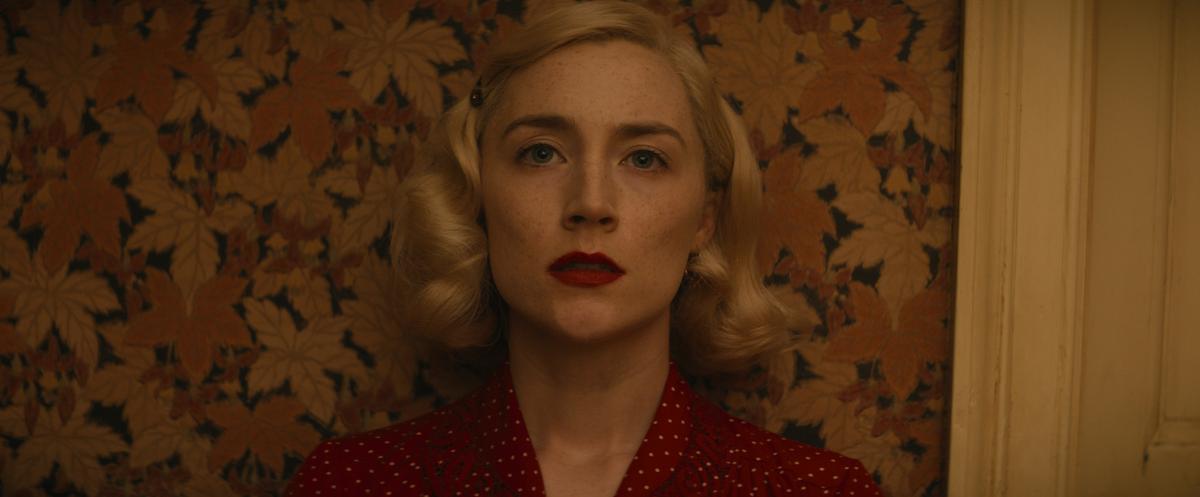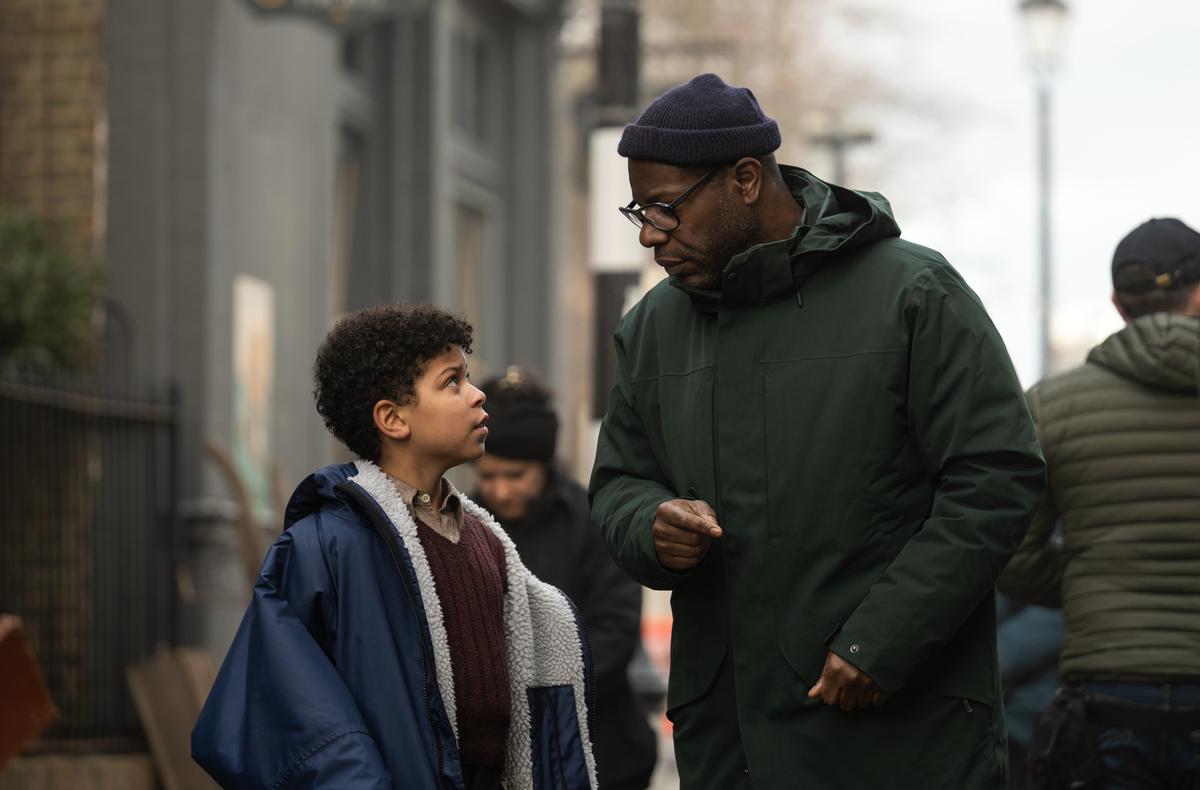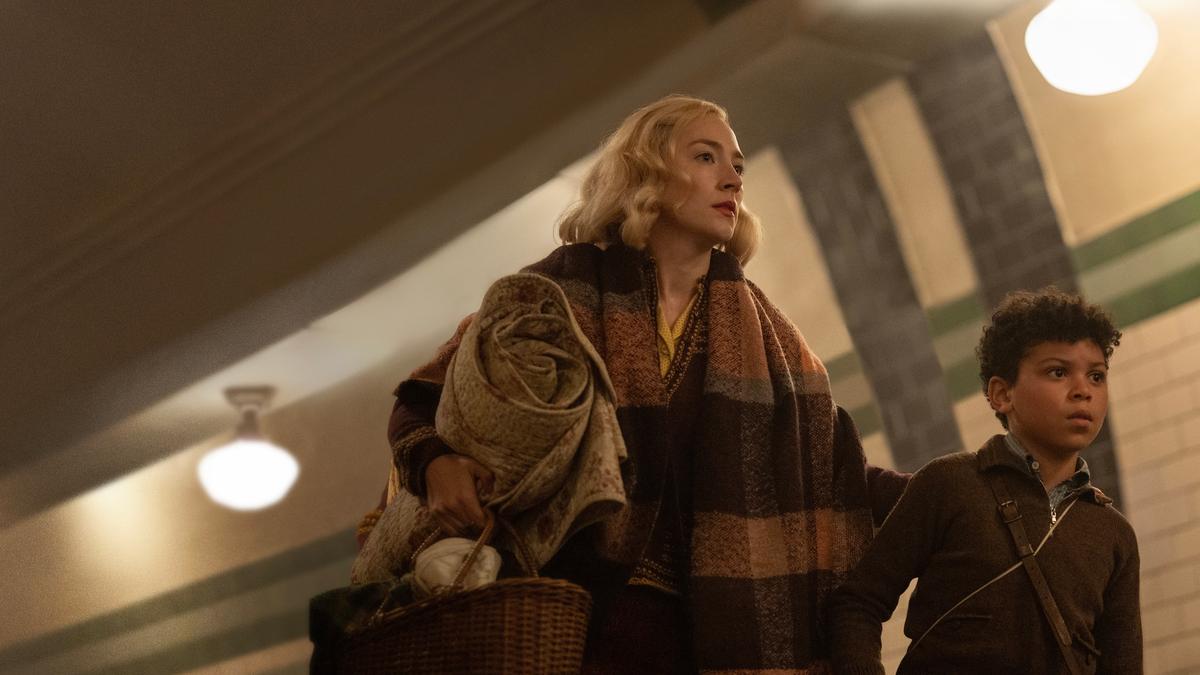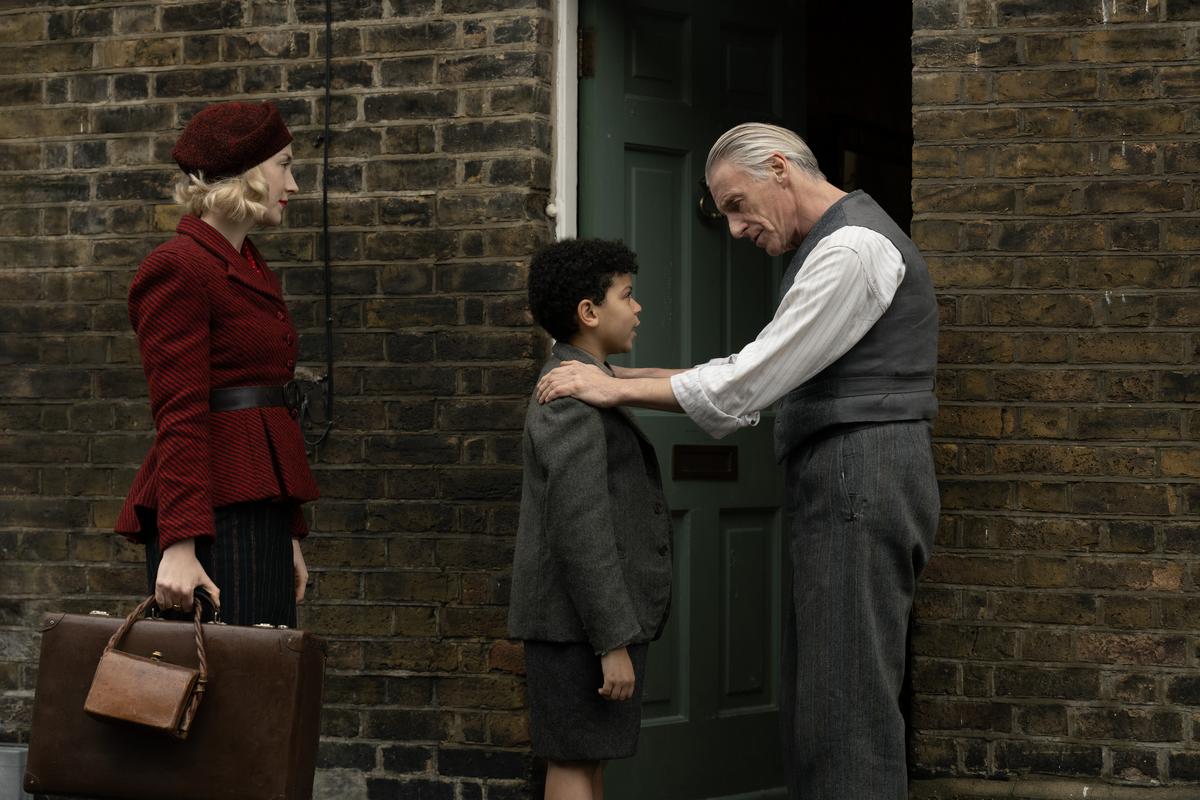Table of Contents
There’s a curious alchemy to Saoirse Ronan’s career. Whether she’s tossing off deadpan zingers in Lady Bird or slipping into corsets to pen poetry with devastating grace in Little Women, there’s an effervescence to her persona that somehow feels entirely grounded. Now, in Steve McQueen’s Blitz, she finds herself exploring new terrain, but not without the weight of history pressing in. Set against the backdrop of WWII, Saoirse brings that same off-kilter brilliance to the role of Rita, a young mother searching for her missing son amidst the bomb-shattered streets of wartime London.

McQueen’s film — equal parts elegy and odyssey — captures the chaos of war through the eyes of Rita’s nine-year-old son, George, played by newcomer Elliott Heffernan. But it’s Saoirse’s portrayal of Rita that forms the soul of this narrative, adding layers to a role that could have easily been lost in the clamour of more conventional war-drama tropes.
McQueen isn’t interested in the stiff-upper-lip archetypes that usually haunt the genre. Instead, Blitz zooms in on Rita, a woman not so much waiting for victory as simply trying to survive the day — and occasionally steal a moment to sing. Saoirse’s frankness is a breath of fresh air. The six-time Academy Award nominee admits that had it been another tale of soldiers charging into battle while the women stayed home, she wouldn’t have touched it.

Saoirse Ronan in a still from Steve McQueen’s ‘Blitz’
| Photo Credit:
Apple TV
Her Rita is no shrinking violet; she’s a woman who fell in love with a West Indian seaman at 17, raising their son in a London that looks kindly on neither love nor difference. Through George’s journey, the film explores not just the horrors of war, but the subtler violence of being a child who learns he doesn’t belong everywhere. And just like that, Saoirse found herself swept into a film that — much like her own decorated career — refuses to conform to what’s expected, and might just translate to more Oscar recognition, come award season.
Here, Saoirse talks about forging a genuine friendship with her young co-star, cooking up a little musical madness with Emmy-winner Nicholas Britell, and the importance of highlighting unspoken voices during conflicts.
Excerpts:
You’ve come a long way since your breakout role as Briony in ‘Atonement’. Did your early experiences on set influence how you approached your relationship with Elliot? Did you feel a sense of protectiveness, given that you were once a child actor too?
Saoirse: Absolutely. I was very conscious that this was Elliot’s first time on a film set, and those early experiences are ones you remember forever. It’s so important that they’re positive, especially for kids. No matter the atmosphere on set, there are always wonderful people who look out for you, making sure you’re having fun. That was my experience, and it really shaped my relationship with work — it never felt like something serious; it was just fun.
So I knew we had to be mindful of that for Elliot and protect that experience for him. I understood what it was like to be in his shoes, playing a lead role at a young age, in a way no one else on set really could. That gave me a sense of responsibility and made me want to be an ally to him. We developed a friendship pretty quickly, and that connection between us definitely carried over into the dynamic you see on screen.

Elliot Heffernan and director Steve McQueen in a behind-the-scenes still from ‘Blitz’
| Photo Credit:
Apple TV
This movie has a particular focus on civilians — it doesn’t concentrate on soldiers or politicians like many other war films. That feels relevant right now, given everything happening in the world. How did working on this story make you reflect on the current tragedies we’re facing? Was there a conscious effort to avoid turning war into a spectacle?
Saoirse: I think we really needed to protect our state of mind — especially Elliot’s — so he didn’t get too immersed in the seriousness and heaviness of it, which could’ve affected his experience. We tried to keep things as fun and light as possible for him when he was around. But there were definitely moments when the war in Ukraine, which had just started a few months earlier, weighed on us.

With social media now, people everywhere have direct access to what’s happening in other parts of the world, and they can share their experiences in real-time in ways that weren’t possible before. This gives us a deeper awareness of everyday struggles that you don’t necessarily get from a news bulletin. It feels more personal, and it was impossible not to think about the impact on people left behind — especially children and their parents. There was this real sense of humanity in what Steve created — something he always brings to his work — that made it feel like this film absolutely had to be made right now.
Seeing these women characters working tirelessly, yet going unnoticed, what did you learn about women from this specific time period?
Saoirse: You often hear about mothers sending their children away for safety during the war, but what really struck me was how much the war changed the male-female dynamic. Women had to step into roles that had traditionally been closed to them. That independence — earning their own money and making their own decisions — gave them a voice they weren’t willing to give up once the war was over. It had a profound effect on how women saw themselves and what they expected from life afterward. I knew about this shift before, but embodying it through a character made it feel more personal and real than simply reading about it in a book.

Saoirse Ronan and Elliot Heffernan in a still from Steve McQueen’s ‘Blitz’
| Photo Credit:
Apple TV
What was it like working with Nicholas Britell on the music? Did you have any favorite scores of his going into the project?
Saoirse: I love Succession — it’s genius. Watching Nicholas break down how he created that score is fascinating. When I first met him, I was surprised — he’s the sweetest guy, and it’s so unassuming that he created this cool, hip-hop-inspired operatic soundtrack.
For this film, Nicholas tapped into a British wartime sound but made it feel modern. He was also incredibly accommodating, knowing I’m not a professional singer. He made adjustments to help me feel comfortable and confident, which was really lovely. Working with him felt like a true collaboration — he wanted the music to reflect what was happening between Elliot, Paul, and me on screen.

“Hans made it work by drawing from personal experience. His mother lived in London during the Blitz, and after his father’s death, Hans grew up in boarding schools, which gave him insight into George’s character. Much of the music reflects George’s perspective and evolves organically with his journey. Nicholas’ [Britell] involvement, blending original songs and score, added another layer — similar to how we worked together on ‘12 Years a Slave’, bringing the dream team back.”Director Steve McQueen on collaborating with Hans Zimmer for the film’s orginal score
Rita’s character always looks elegant, even amid ruins — her hair, her makeup, her clothes all reflect a subtle dignity. Can you tell us about the work the costume department did to create her look?
Saoirse: Jacqueline Durran did the costumes, and in my opinion, she’s the best costume designer in the world. I’ve worked with her since I was 12, and we’ve developed a great working relationship over the years. Her approach is always very character-driven and emotional. She encourages actors to be involved in the decision-making, even down to details like choosing colours that resonate with the character.
We’ve had those conversations on every project we’ve worked on together — whether it was Briony in Atonement, Jo March in Little Women, or now with Rita. For Rita, we didn’t want her to feel flashy. Instead, her elegance comes from the strength she’s had to develop over time, having experienced significant loss and hardship.

Rita lost her mother at a young age, fell in love, became pregnant, and then had that love taken away from her. She’s also endured racism in her own city toward people she loves. There’s a quiet resilience and worldliness in how she carries herself, and we wanted that to come through in her look.
The film makes a strong case that art and culture aren’t alienating, even in times of crisis. Why do you think tragedy often inspires great art?
Saoirse: Someone recently said that the Irish are great storytellers because, for so long, we didn’t have much besides music, stories, and each other. I think that’s true of any culture — when times are tough, people instinctively turn to art to connect and feel less alone.
It doesn’t take much to create music or tell a story — these things are accessible to everyone, which makes them powerful tools for expression. Steve really captures that beautifully in the film.

Saoirse Ronan, Elliot Heffernan and Paul Weller in a still from Steve McQueen’s ‘Blitz’
| Photo Credit:
Apple TV
They say the only way not to repeat the past is to keep talking about it. What’s the most important lesson you learned from the period that’s relevant today?
Saoirse: The people left behind are just as crucial to unity and success as those on the battlefield. Their role requires immense strength — working through fear and loss — and that’s something I find deeply admirable. There will always be people left behind, and keeping them in mind is incredibly important.

You’re premiering the movie at the London Film Festival, and there’s already a lot of buzz around it. People are talking about awards, and you’ve been nominated and won plenty before. How do you handle that? I imagine you don’t think about awards while shooting, but how do you deal with the pressure now, during promotions and events?
Saoirse: I feel less pressure now than I used to. It’s easy to get caught up in all that, but the more you experience it, the more you realize how unpredictable the awards race can be, which helps put things in perspective. Ultimately, just being part of the conversation gives the film a level of prestige that makes people more likely to see it — and that’s what we want. We want people to go to the cinema and connect with it in some way. That’s really what awards should be about — encouraging people to engage with the project.
Blitz is slated for release on Apple TV on November 22, 2024
Published – October 23, 2024 05:02 pm IST

